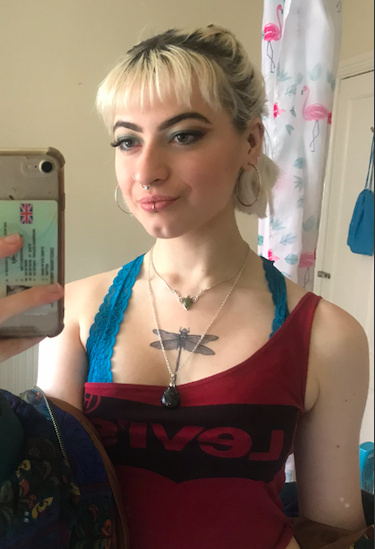Veganism in Vogue: The Rise of Animal-Free Fashion
- Alice Gilchrist-Miller

- Sep 22, 2021
- 4 min read

Veganism: love it or hate it, it seems to be something everyone has a strong opinion about. Thanks to celebrity support, environmentalist documentaries, the Veganuary initiative and the general obsession with Instagram-able avocado toast, the cultural rise of veganism from a fringe idea to mainstream movement is undeniable.
I, myself was a vegan for over a year and continue to enjoy a primarily plant-based diet to this day. Don’t worry – I’m not about to insist you live off home-grown lettuce and wake up at 5am to milk your own almonds (although if that’s what floats your boat, I certainly wouldn’t stop you). Despite what some of the more vocal vegan activists might claim, I get that veganism isn’t for everyone. Whether it be lack of access to fresh fruit and veg, not having the time to home-cook most of your meals from scratch, or simply not wanting to stop eating animal products, many people choose not to follow a vegan diet. And that’s totally ok.
But what if I told you that you don’t have to give up your favourite chocolate, chicken, or pepperoni pizza to share in the environmental benefit and humane animal welfare that comes with the vegan lifestyle - and look stylish while doing so?
The vegan fashion movement
Veganism isn’t just about what's for dinner; it’s also about what you wear. The vegan philosophy - which advocates a lifestyle completely free of animal products - has taken the fashion industry by storm, with the global market for vegan women’s fashion now being valued at close to 400 billion dollars, and estimated to continue growing at a steady rate of 13.6% from 2020 onwards. The internet, and the online shopping it facilitates, has played a significant role in this rising popularity, with UK web searches for ‘vegan fashion’ and ‘vegan clothes’ increasing by 39% in the three years leading up to 2018. The popular demand for animal-free fashion has culminated in the 2018 debut of Vegan Fashion Week, an annual event held in Los Angeles (perhaps the worlds' most quintessentially vegan city) as a four-day celebration of cruelty-free practice and the advancement of the animal rights movement in the fashion industry.
But what actually is vegan fashion? Does it mean the end of decadent furs, edgy leathers and eternally trendy leopard prints? You may be surprised to find that in fact, it's quite the opposite! While naturally necessitating the exclusion of animal skins, furs, feathers and other animal-based products such as silks, cashmeres, wool, suede, and certain dyes, vegan fashion is by no means obligated to remove these elements altogether. An ever-growing range of innovative vegan alternatives allows for the incorporation of animal-based stylistic choices without the unfortunate consequences of animal suffering and environmental damage.
Why choose vegan fashion?
Choosing vegan fashion lets you ditch the downsides of traditional animal products, without ditching your sense of style. While animal skins may have provided our first fashion garments many millennia ago, it becomes difficult to justify the exploitative use of animals in our technological, resource-rich modern society for just the superficial sake of 'looking good'.
The benefit of choosing vegan fashion items over their animal-based counterparts is two-fold. In regards to the environmental benefits, a 2017 report on the sustainability of the global fashion industry found that animal-based fibers represent four of the top five least environmentally friendly materials used for fashion. Notably, cow leather tops the list as the most damaging textile, producing annual CO2 emissions equal to that of 30 million cars. In comparison, the report - which compared variables such as the impact on global warming and water scarcity - found that vegan faux leather (made with everything from kombucha-cultures to pineapple) contributes just one-third the environmental impact of its animal-based equivalent, rendering it far more sustainable. Similarly, the Higgs Materials Sustainability Index shows that the impact of natural leather and wool are far worse than that of their synthetic counterparts, of nylons and even plastic-based polyesters.
Secondly, the benefits of vegan fashion on animal welfare are, of course, self-explanatory. Traditionally, animals on fur farms are imprisoned in cramped dirty cages before being inhumanely slaughtered by electrocution, suffocation and gassing. The majority of the world's leather comes from developing countries like India and China, where animals' skin is routinely ripped from their bodies while still conscious. Meanwhile, the primary method of obtaining wool is called 'mulesing', a mutilative practise in which flesh is cut - without anaesthesia - from lambs' backs in large chunks. Yikes.
While animal fibers such as these are often referred as 'by-products' of the meat industry, the truth is that these cruel practises are profitable trades within themselves and sustain industries worth billions of dollars. Comparatively, the consumption of cruelty-free vegan fashion represents a simple, attainable way to boycott the systematic animal abuse hiding beneath the glamorous, Louis Vuitton-printed veneer of the global fashion industry.
Check out these trendy vegan fashion designers
Clearly, Veganism is very much in vogue. Liking the idea, but not sure how to make the change? It might be easier than you think....
Popular vegan-friendly high fashion designers include newly vegan Tom Ford, Vivienne Westwood, Donatella Versace, London based Stella McCartney, and New York based Mara Hoffman. If you're looking for something a little less pricey, many high-street fashion retailers now include vegan collections, including the likes of H&M, Zara, Topshop and New Look. To truly embrace the vegan philosophy, however, it's best to shop from the fully-vegan fashion brands that place cruelty-free sustainability at the centre of everything they do.
Whichever way you choose to do it, going vegan has never been easier. Now, looking good truly can be good for everyone.



Comments